
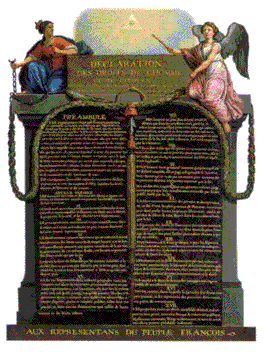
Declaration
of Human Rights; 1798-version
(see
also in detail the
V.N.-version
).
Charter
of Order
The
Declaration of Human Rights of 1789 founded the
freedom of the French after the revolution to
the example of the declaration of independence
in America. With this revolution influenced by
the ideas of the philosopher Jean-Jacques
Rousseau (1712-1778) came it in France
nationally and internationally, to opposition
with the philosophy of Enlightenment of the
centuries before in which gradually religion and
science had drifted apart. It was now science
itself that philosophically got divided. It was
no longer a gentleman's discussion between
empiricists and rationalists about the value of
inductive - from the specific to the general; -
and deductive - from the general to the specific
- reasoning; it became a political struggle
between liberals and conservatives. With
Rousseau, himself an emotionally challenged
person of the common people, was civilization
from then on not right away considered good or
elevated, but on the contrary bad; the emotional
was the good of nature and was superior to
reason; and the interest of the individual was
subordinate to that of the group. The
sovereignty of reason which would not so much
accept the lead of the sensual as the lead of
the - possibly not provable - moral principle,
was, also following empirical philosophy of
eighteenth century England, called in question
as being a source of knowledge and subjected to
a system of political, democratic control from
without. The man of nature had to prevail over
man of culture, feeling had to prevbail over the
mind. The conflict between empirical feeling en
rational understanding, arising from the
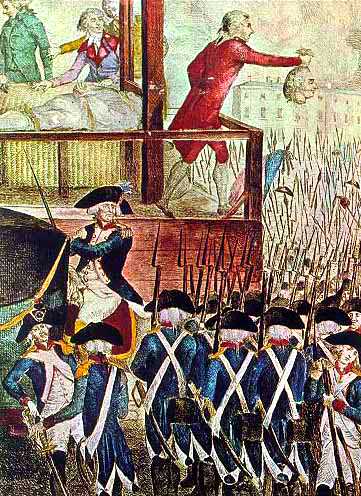 philosophy
of Enlightenment, materialized with the
impurities of the philosopher's ego in that
Revolution. In christian reform reached
Enlightenment a deadlock, being ignorant and
thus in fact unenlightened about what factually
the concern of authority was, who would have the
last word with the plea for the individual
person heard since the fall of catholic Rome.
Christian Reform, in countering the religious
and noble ego, only resulted in more ego. In
fact could the ego of societal classes and
status groups - which indian-style taken
together could be called castes - not arrive at
purification in the Enlightenment, that indeed
did justice to the truth of the individual, but
couldn't find any liberation in a commonly felt
respect for the person. The classical ideal of
an integrity of thought and feeling in one
universal science, in one historically founded
classical order, was lost fighting about
political power. Rationality and religiosity not
of love for nature, the way Rousseau put it,
turned out to be nothing but treason to human
nature. That passion, that maybe positively
aggressive and uncontrolled nature of what he
called the 'noble savage' is the honesty
that should liberate thus was the creed of the
Revolutionary 'Enlightenment' that opposed the
failed elitist 'Enlightenment'. In fact was the
liberal philosophy of the revolutionaries the
manifestation of the concept of enlightenment
that itself therewith found its demise. The fray
of the ego of the philosophers in that idea of
enlightenment, that notion of a separated,
individualized and emancipated self, could find
no freedom from fear and misery in service to
the ideal. From the philosophy of reason one had
landed in a philosophy of rationalistic
repression and self-righteousness. Together with
the philosophers Voltaire and Diderot arose, as
the upbeat to the later twentieth century
horrors - that in the form of world wars would
manifest themselves as the backlash of colonial
violence - a willingness for violence because
that would be the only way to counter and
overturn the cramped falsehood and
possessiveness of especially the clergy and the
nobles exploiting being a burden to the citizen
(or the colonial subject or slave). With the
revolutionary liberalism which, notwithstanding
nineteenth century romantic and puritan efforts
to restore the classical order, freaked out a
century later in communism and fascism, then
smothered in the blood of the ignorant citizens
the last bit of philosophical pride and
self-esteem of the westerner who, at the
beginning of the twenty-first century is at a
loss with the ever lingering opposition of, this
time, the fundamentalists. For the struggle of
the classes continues as long as those classes
due to the absence of a philosophy of
association try to subdue or exclude one
another. philosophy
of Enlightenment, materialized with the
impurities of the philosopher's ego in that
Revolution. In christian reform reached
Enlightenment a deadlock, being ignorant and
thus in fact unenlightened about what factually
the concern of authority was, who would have the
last word with the plea for the individual
person heard since the fall of catholic Rome.
Christian Reform, in countering the religious
and noble ego, only resulted in more ego. In
fact could the ego of societal classes and
status groups - which indian-style taken
together could be called castes - not arrive at
purification in the Enlightenment, that indeed
did justice to the truth of the individual, but
couldn't find any liberation in a commonly felt
respect for the person. The classical ideal of
an integrity of thought and feeling in one
universal science, in one historically founded
classical order, was lost fighting about
political power. Rationality and religiosity not
of love for nature, the way Rousseau put it,
turned out to be nothing but treason to human
nature. That passion, that maybe positively
aggressive and uncontrolled nature of what he
called the 'noble savage' is the honesty
that should liberate thus was the creed of the
Revolutionary 'Enlightenment' that opposed the
failed elitist 'Enlightenment'. In fact was the
liberal philosophy of the revolutionaries the
manifestation of the concept of enlightenment
that itself therewith found its demise. The fray
of the ego of the philosophers in that idea of
enlightenment, that notion of a separated,
individualized and emancipated self, could find
no freedom from fear and misery in service to
the ideal. From the philosophy of reason one had
landed in a philosophy of rationalistic
repression and self-righteousness. Together with
the philosophers Voltaire and Diderot arose, as
the upbeat to the later twentieth century
horrors - that in the form of world wars would
manifest themselves as the backlash of colonial
violence - a willingness for violence because
that would be the only way to counter and
overturn the cramped falsehood and
possessiveness of especially the clergy and the
nobles exploiting being a burden to the citizen
(or the colonial subject or slave). With the
revolutionary liberalism which, notwithstanding
nineteenth century romantic and puritan efforts
to restore the classical order, freaked out a
century later in communism and fascism, then
smothered in the blood of the ignorant citizens
the last bit of philosophical pride and
self-esteem of the westerner who, at the
beginning of the twenty-first century is at a
loss with the ever lingering opposition of, this
time, the fundamentalists. For the struggle of
the classes continues as long as those classes
due to the absence of a philosophy of
association try to subdue or exclude one
another.
The
drama of western philosophy is that with all the
manslaughter of the citizen missing a good lead
the philosophers each for themselves are still
quite right; of course must reason prevail,
experience be decisive and must we become
brothers without the falsehood of a culture
going against nature. Naturally, but what for
God is the integrity of this philosophy, what is
the place of all these separate ideas in one
coherent culture? Christianity fell short with
itself, more was needed, at least more respect
for other cultures that, so was discovered with
imported china from the Far East and such,
possibly also could be offering something. The
Germans I.
Kant
(1724-1804) and A. Schopenhauer (1788-1860) were
of no insignificant contribution in the
nineteenth century to put the dualistic strife
to an end and arrive at a better cultural
integration. But in de end proved I.
Kant,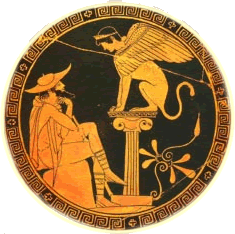 the philosopher of dualism, noumenal (to the
spirit) be it phenomenal (to the phenomenon),
not capable of proper reference and turned
Schopenhauer, who was capable, out not to be
able to attach much belief to the authority of
that reference, found in eastern philosophy. He
indeed connected the eastern with the western of
philosophy, but remained spiritually impure in
the dark with his disbelief in a controlling
personal Godhead. He verily, as it should,
discriminated between an A and an A, two
identical variables that nevertheless differ in
time and space, but was with the free from
illusion identifying of the phenomenal with the
noumenal of the philosophy of I. Kant that he
wanted to perfect and complete, just like
Baruch
Spinoza
(1632-1677) with his denial of the miraculous
caught in the impersonal, which, with the denial
of the cyclic and balanced of the person,
inevitably leads to chaos. And so arose in the
nineteenth century the further breaking up of
science in the analytical schools and esoteric
schools of psychology and theosophy that more
doctrinaire than philosophical emphasized a
self-realization which also couldn't get beyond
the still more in books condensed ego of the
antroposophical purple underwear that had to be
rejected by the Indian guru J. Krishnamurti
(1895-1986) and the finite cigar in the mouth of
S.
Freud
(1856-1939) which cost him his health.
the philosopher of dualism, noumenal (to the
spirit) be it phenomenal (to the phenomenon),
not capable of proper reference and turned
Schopenhauer, who was capable, out not to be
able to attach much belief to the authority of
that reference, found in eastern philosophy. He
indeed connected the eastern with the western of
philosophy, but remained spiritually impure in
the dark with his disbelief in a controlling
personal Godhead. He verily, as it should,
discriminated between an A and an A, two
identical variables that nevertheless differ in
time and space, but was with the free from
illusion identifying of the phenomenal with the
noumenal of the philosophy of I. Kant that he
wanted to perfect and complete, just like
Baruch
Spinoza
(1632-1677) with his denial of the miraculous
caught in the impersonal, which, with the denial
of the cyclic and balanced of the person,
inevitably leads to chaos. And so arose in the
nineteenth century the further breaking up of
science in the analytical schools and esoteric
schools of psychology and theosophy that more
doctrinaire than philosophical emphasized a
self-realization which also couldn't get beyond
the still more in books condensed ego of the
antroposophical purple underwear that had to be
rejected by the Indian guru J. Krishnamurti
(1895-1986) and the finite cigar in the mouth of
S.
Freud
(1856-1939) which cost him his health.
The
philosophy, gradually repressed by political and
therapeutic practices of problem-solving, died
in the twentieth century a silent death in the
existentialism that could only be disgusted with
the lies of modern violent mankind. For the old
existentialist J.P.
Sartre
(1905-1980),
who with his love for drugs and sex had lived
against Father Time with His classical morality,
it was too late to consult Freud to cure from
his Oedipus complex of having went against that
same father. Freud, before him, could solve the
problem himself neither by his speculations and
turn the tide of the philosophy of violence of
the class struggle that went further than that
of laborers against capitalists the way
Karl
Marx
(1818-1883) to the ideal had pictured it to
himself. We know that the national-socialistic
fascists of the freaked-out state-formalism and
-militarism are just as dangerous co-actors and
that finally there are the fundamentalists to
teach us once and for all a terrorist lesson for
being the arrogance of socialistic-fascistic
capitalism that considers poverty a sin...
For
us remains to be said that we at the beginning
of the twentieth century seriously have lost our
philosophical way. We don't, more or less
standardized, tick right, to the order of the
apparent sun; we are not in order with our
philosophies of morality, justice, economy and
time-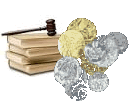 management.
We in fact have lost the integrity of the
mindful and are hardly capable of staying
reasonable with the problems of cultural
integration, unemployment, the care for the
elderly and common heath-care. The
judicial-economic paradigm of controlling the
state with money and books of law is
compromised. The two sciences don't manage that
well alone being in power, the philosophers are
at their last gasp, the psychologists and
psychiatrists are constantly embarrassed
adapting dysfunctioning people to the ill-willed
system and the stock of gurus from the far east
is also depleted, for they have said and modeled
all they could. 'Please process your data, they
suffice', is their message. management.
We in fact have lost the integrity of the
mindful and are hardly capable of staying
reasonable with the problems of cultural
integration, unemployment, the care for the
elderly and common heath-care. The
judicial-economic paradigm of controlling the
state with money and books of law is
compromised. The two sciences don't manage that
well alone being in power, the philosophers are
at their last gasp, the psychologists and
psychiatrists are constantly embarrassed
adapting dysfunctioning people to the ill-willed
system and the stock of gurus from the far east
is also depleted, for they have said and modeled
all they could. 'Please process your data, they
suffice', is their message.
so
be it with with the chaos of post-modern time in
which even punk-hair and a leather jacket looks
bourgeois. We'll have to get our things back on
the road again and properly investigate to make
sure what exactly is holding us back. Is it
really so that we with A. Schopenhauer,
Madame
H. P. Blavatski
(1831-1891) and A.
Bailey
(1880-1949) know enough of eastern philosophy?
Is it really so that the rationalism of
Descartes would hold no value or sway anymore,
that the Hare Krishna's are a cult, that the
ether is nothing but the medium of the radio,
and that the empiricism of the English would be
so materialistic? Is it really so that the
liberal, the communist and the socialist,
nationalist be it idealist, offer no essential
contribution with the love for the natural
community-person? Is Einstein really our savior
to determine what is absolute in the universe?
No of course not. In fact is, filognostically
seen, the philosophy, or science for itself,
notwithstanding these questions, not the problem
at all. Philosophy, together with its empirical
result is, including theology and psychology,
the solution thus, but then with the restriction
of working like a good paradigm which combines
to the point of religion with a sane rational
spirituality and an empirical strategy of
respect for the person. No single truth of the
person is in fact wrong as long as that person
knows who he is, what his freedom to move,
emancipating or sliding down, would be and where
he stands in society.
Thus
may one, philosophically of opposition neither
contend that the ascending, inductive process of
acquiring knowledge, in India called aroha, of
the transcending or rising above,
moving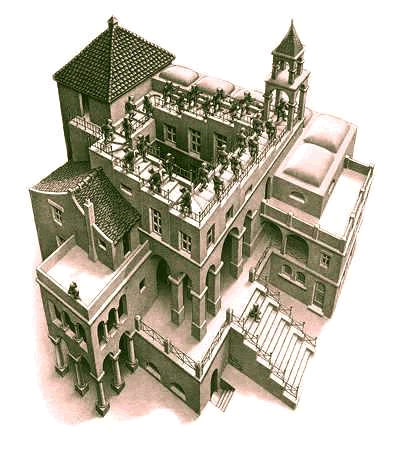 from the particular to the general, would be
wrong because of the induction-problem that not
all swans are white. Religious people are, even
though for instance the Vishnu-adepts in India
are not in favor of it, doing nothing else when
they pray to realize themselves their Godhead,
making up half the world-population being
predominantly peaceful and sane with it. Neither
is the avaroha-process of the more scientific
deductive, rational and principally responsible
descending from the general to the specific of a
material distinction to be considered wrong.
Jesus, Mohammed, Krishna, you and also me thus
descended from heaven, even though our premiss
of divinity cannot be proven that states that
non-violence e.g. would be right with the
struggle that we on earth have to afford against
the evil of godlessness, illusion and injustice.
It is more an escher-staircase or a Jacob's
ladder to heaven we as well have to use walking
up as walking down (in fact doing both at the
same time).
from the particular to the general, would be
wrong because of the induction-problem that not
all swans are white. Religious people are, even
though for instance the Vishnu-adepts in India
are not in favor of it, doing nothing else when
they pray to realize themselves their Godhead,
making up half the world-population being
predominantly peaceful and sane with it. Neither
is the avaroha-process of the more scientific
deductive, rational and principally responsible
descending from the general to the specific of a
material distinction to be considered wrong.
Jesus, Mohammed, Krishna, you and also me thus
descended from heaven, even though our premiss
of divinity cannot be proven that states that
non-violence e.g. would be right with the
struggle that we on earth have to afford against
the evil of godlessness, illusion and injustice.
It is more an escher-staircase or a Jacob's
ladder to heaven we as well have to use walking
up as walking down (in fact doing both at the
same time).
No,
the problem is rather to arrive at an order, the
being in order, the fitting in with everyone in
one concept of world order. Everybody wants to
be in order, but nobody seems, as evidenced by
the continuation of warfare, the decay and other
miseries, to be really effective in the present
postmodern liberality, or to be in agreement, as
to how or what that order would be. Given the
desire to be effective and to know, we will have
to develop the love for the knowledge, the
filognosy, which pictures us that order
unambiguously. Also will we have to admit that
that will be of consequence and that thus
something like a reform, restoration, turnover
or rebirth must take place. The problem must be
identified, the solution must be offered, the
counter-arguments must be investigated, the
conclusion will have to be drawn and the summary
will have to be presented. In other words,
without this methodical approach it will all
result in nada; and therewith we end up with the
beginning of our general thesis concerning the
method as before was mentioned in the
introduction and the preface. With putting first
ancient India providing us the fundamental
notion of the method, the nyâya,
can one not escape the insight that we with our
modern philosophy of enlightenment concerning
individual responsibilities are but newcomers to
a classical teaching. 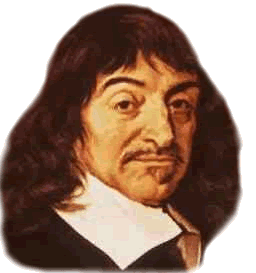 No
reason to be gloomy having lost Descartes out of
sight with our 'revolutions', now for our
atonement feeling abliged to sit at the feet of
the gurus from the East. We were, just
restarting as if our system was a computer, not
doing that bad at all. From Descartes we for a
great deal learned to know the Enlightenment of
an autonomous voice of reason from within
already. From him are we as persons defined as
selves of logic and reason. His writing is still
respected as the basis for the rationally
founded science to arrive from preconceived
premisses and principles at very concrete
practical propositions, implementations and
political decisions. As for this is the
filognosy concerned with the restoration of the
principle of the sovereignty of reason; and that
on the authority of the fact that we also find
that unambiguously with the for India most
important philosopher Dvaipâyana
Vyâsadeva, also named Bâdarayana,
who in the Krishna-bible, the Bhâgavata
Purâna 3.26:
62-70,
states that only by the power of reason the
original person can be awakened, and not by any
other case or godhead, not even by the supreme,
personal and purely good transcendental godhead
Lord Vishnu. He also in his famous Bhagavad
Gîtâ, 3.18,
provides evidence of this allegiance to the
sovereign interest, in stating that the pure
devotee is independent. It is that truth which
was overlooked in the modern chaos and with
which the rationalism of Descartes relativistic
with the modern electromagnetic time of
J.
C. Maxwell
(1831-1879) and Einstein seemed to have served
its turn at the one hand, while at the other
hand the church considered him a threat. But we
will, to the fundamental thesis of our
investigation, show that just this single vedic
truth of logic and reason on itself suffices,
despite of all the desperate western
philosophizing to our honor. The methodical
charter of order of Descartes is hereby valid as
the proof that we deliver to the defense of the
thesis that we as westerners ourselves are the
ones who constantly had the full rights of the
individual person and soul in his autonomy of
judgement in our banner. it was just the vedic
reference that was missing to be really sure
that we, be it more intuitive, have our roots in
the oldest and most traditional of human
culture. No
reason to be gloomy having lost Descartes out of
sight with our 'revolutions', now for our
atonement feeling abliged to sit at the feet of
the gurus from the East. We were, just
restarting as if our system was a computer, not
doing that bad at all. From Descartes we for a
great deal learned to know the Enlightenment of
an autonomous voice of reason from within
already. From him are we as persons defined as
selves of logic and reason. His writing is still
respected as the basis for the rationally
founded science to arrive from preconceived
premisses and principles at very concrete
practical propositions, implementations and
political decisions. As for this is the
filognosy concerned with the restoration of the
principle of the sovereignty of reason; and that
on the authority of the fact that we also find
that unambiguously with the for India most
important philosopher Dvaipâyana
Vyâsadeva, also named Bâdarayana,
who in the Krishna-bible, the Bhâgavata
Purâna 3.26:
62-70,
states that only by the power of reason the
original person can be awakened, and not by any
other case or godhead, not even by the supreme,
personal and purely good transcendental godhead
Lord Vishnu. He also in his famous Bhagavad
Gîtâ, 3.18,
provides evidence of this allegiance to the
sovereign interest, in stating that the pure
devotee is independent. It is that truth which
was overlooked in the modern chaos and with
which the rationalism of Descartes relativistic
with the modern electromagnetic time of
J.
C. Maxwell
(1831-1879) and Einstein seemed to have served
its turn at the one hand, while at the other
hand the church considered him a threat. But we
will, to the fundamental thesis of our
investigation, show that just this single vedic
truth of logic and reason on itself suffices,
despite of all the desperate western
philosophizing to our honor. The methodical
charter of order of Descartes is hereby valid as
the proof that we deliver to the defense of the
thesis that we as westerners ourselves are the
ones who constantly had the full rights of the
individual person and soul in his autonomy of
judgement in our banner. it was just the vedic
reference that was missing to be really sure
that we, be it more intuitive, have our roots in
the oldest and most traditional of human
culture.
The
Charter of Order for the purpose of reasoning
about the order of time and the control of
forces with the ether the way it is presented as
from now, is part of a philosophical treatise
that basically formulates our method of approach
with our filognostical love for knowledge. The
work it is taken from is called: 'On the
method'. It was written in the seventeenth
century by the french philosopher, who together
with the reason and the rationality defended the
concept of soul. Het is he who declared 'I think
therefore I am' to indicate that a sound mind on
itself is enough to be certain of one's
existence. Halfway this piece is the method
discussed that he discovered, but thus long
before him existed in India as a standard for
the central philosophy of also religiously
living together.

His
idea of the method consists of four parts to
which the Indian concept dividing the matter in
five, adds a preceding thesis. With him the
thesis is expressed in the first part of doubt.
His dividing accords with what in the
nyâya constitutes the
counter-argument in response to the doubt
before. Descartes' complexity is vedically then
the conclusion of the investigation and the
principle of completeness corresponds with what
in the nyâya is called the
siddhânta, the complete truth of
the end conclusion or the summary. Thus one
knows of Descartes:
1)
Doubt,
to be sure of what the truth would be.
2) Division,
in order to control the subject of study in
its different aspects.
3) Complexity,
or the assigning of such an order that the
relationships of the different elements of
the division becomes clear.
4) Completeness,
to cover with the order thus achieved the
complete of reality in such a manner that as
much elements as possible are
incorporated.
This
together constitutes the essence of the
classical philosophical method to uncover the
truth of, in our case, the subject of the order
of time and the consciousness of time in
checking us with the ether. The purpose of this
all is to arrive at a vision of our reality free
from illusion the way it is now, it was in the
past and will be in the future. It is the
striving for freedom from illusion which binds
philosophy, science and religion in one
unambiguous filognosy. Nor to the facts, nor to
the principles, nor to the person must we be of
illusion.
Later
in section III-A of this site, the department
Personal,
will René Descartes again be discussed.
But now first his treatise which, with his
verbose sentences, is not as easy to read must
be said. It is only a part of the entire
scripture, but that part which discusses the
essence of the method. This version is taken
from the, by us also upgraded, piece
free
available on the
internet,
and
was baptized: 'On Doubt, Division, Complexity
and Completeness':
'...I
was
then in Germany, attracted toward that place
by the wars in that country, which have not
yet been brought to a termination; and as I
was returning to the army from the coronation
of the emperor, the setting in of winter
arrested me in a locality where, as I found
no society to interest me, and was besides
fortunately undisturbed by any cares or
passions, I remained the whole day in
seclusion, with full opportunity to occupy my
attention with my own thoughts. Of these one
of the very first that occurred to me was,
that there is seldom so much perfection in
works composed of many separate parts, upon
which many had laid their hands, as in those
completed by a single master. Thus it is
observable that the buildings which a single
architect has planned and executed, are
generally more elegant and convenient than
those which several have attempted to
improve, by making old walls serve for
purposes for which they were not originally
built. Thus also, those ancient cities which,
from being at first only villages, 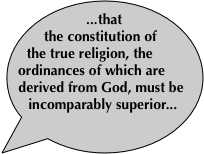 have
become, in course of time, large towns, are
usually but ill laid out compared with the
regularity constructed towns which a
professional architect has freely planned on
an open plain; so that although the several
buildings of the former may often equal or
surpass in beauty those of the latter, yet
when one observes their indiscriminate
juxtaposition, there a large one and here a
small, and the consequent crookedness and
irregularity of the streets, one is disposed
to allege that chance rather than any human
will guided by reason must have led to such
an arrangement. And if we consider that
nevertheless there have been at all times
certain officers whose duty it was to see
that private buildings contributed to public
ornament, the difficulty of reaching high
perfection with but the materials of others
to operate on, will be readily acknowledged.
In the same way I thought that those nations
which, starting from a semi-barbarous state
and advancing to civilization by slow
degrees, have had their laws successively
determined, and, as it were, forced upon them
simply by experience of the hurtfulness of
particular crimes and disputes, would by this
process come to be possessed of less perfect
institutions than those which, from the
commencement of their association as
communities, have followed the appointments
of some wise legislator. It is thus quite
certain that the constitution of the true
religion, the ordinances of which are have
become, in course of time, large towns, are
usually but ill laid out compared with the
regularity constructed towns which a
professional architect has freely planned on
an open plain; so that although the several
buildings of the former may often equal or
surpass in beauty those of the latter, yet
when one observes their indiscriminate
juxtaposition, there a large one and here a
small, and the consequent crookedness and
irregularity of the streets, one is disposed
to allege that chance rather than any human
will guided by reason must have led to such
an arrangement. And if we consider that
nevertheless there have been at all times
certain officers whose duty it was to see
that private buildings contributed to public
ornament, the difficulty of reaching high
perfection with but the materials of others
to operate on, will be readily acknowledged.
In the same way I thought that those nations
which, starting from a semi-barbarous state
and advancing to civilization by slow
degrees, have had their laws successively
determined, and, as it were, forced upon them
simply by experience of the hurtfulness of
particular crimes and disputes, would by this
process come to be possessed of less perfect
institutions than those which, from the
commencement of their association as
communities, have followed the appointments
of some wise legislator. It is thus quite
certain that the constitution of the true
religion, the ordinances of which are
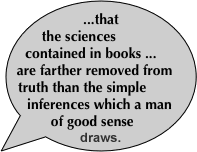 derived
from God, must be incomparably superior to
that of every other. And, to speak of human
affairs, I believe that the supremacy of
Sparta was due not to the goodness of each of
its laws in particular, for many of these
were very strange, and even opposed to good
morals, but to the circumstance that,
originated by a single individual, they all
tended to a single end. In the same way I
thought that the sciences contained in books
(such of them at least as are made up of
probable reasonings, without demonstrations),
composed as they are of the opinions of many
different individuals massed together, are
farther removed from truth than the simple
inferences which a man of good sense using
his natural and unprejudiced judgment draws
respecting the matters of his experience. And
because we have all to pass through a state
of infancy to manhood, and have been of
necessity, for a length of time, governed by
our desires and preceptors (whose dictates
were frequently conflicting, while neither
perhaps always counseled us for the best), I
farther concluded that it is almost
impossible that our judgments can be so
correct or solid as they would have been, had
our reason been mature from the moment of our
birth, and had we always been guided by it
alone. derived
from God, must be incomparably superior to
that of every other. And, to speak of human
affairs, I believe that the supremacy of
Sparta was due not to the goodness of each of
its laws in particular, for many of these
were very strange, and even opposed to good
morals, but to the circumstance that,
originated by a single individual, they all
tended to a single end. In the same way I
thought that the sciences contained in books
(such of them at least as are made up of
probable reasonings, without demonstrations),
composed as they are of the opinions of many
different individuals massed together, are
farther removed from truth than the simple
inferences which a man of good sense using
his natural and unprejudiced judgment draws
respecting the matters of his experience. And
because we have all to pass through a state
of infancy to manhood, and have been of
necessity, for a length of time, governed by
our desires and preceptors (whose dictates
were frequently conflicting, while neither
perhaps always counseled us for the best), I
farther concluded that it is almost
impossible that our judgments can be so
correct or solid as they would have been, had
our reason been mature from the moment of our
birth, and had we always been guided by it
alone.
It
is true, however, that it is not customary to
pull down all the houses of a town with the
single design of rebuilding them differently,
and thereby rendering the streets more
handsome; but it often happens that a private
individual takes down his own with the view
of erecting it anew, and that people are even
sometimes constrained to this when their
houses are in danger of falling from age, or
when the foundations are insecure. With this
before me by way of example, I was persuaded
that it would indeed be preposterous for a
private individual to think of reforming a
state by fundamentally changing it in every
respect, and overturning it in order to set
it up amended; and the same I thought was
true of any similar project for reforming the
body of the sciences, or the order of
teaching them established in the schools: but
as for the opinions which up to that time I
had embraced, I thought that I could not do
better than resolve at once to sweep them
wholly away, that I might afterwards be in a
position to admit either others more correct,
or even perhaps the same when they had
undergone the scrutiny of reason. I firmly
believed that in this way I should much
better succeed in the conduct of my life,
than if I built only upon old foundations,
and leaned upon principles which, in my
youth, I had taken upon trust. For although I
recognized various difficulties in this
undertaking, these were not, however, without
remedy, nor once to be compared with such as
attend the slightest reformation in public
affairs. Large bodies, if once overthrown,
are with great difficulty set up again, or
even kept erect when once seriously shaken,
 and
the fall of such is always disastrous. Then
if there are any imperfections in the
constitutions of states (and that many such
exist the diversity of constitutions is alone
sufficient to assure us), custom has without
doubt materially dealt successfully with
their inconveniences, and has even managed to
steer altogether clear of, or insensibly
corrected a number which keen discernment
could not have provided against with equal
effect; and, in fine, the defects are almost
always more tolerable than the change
necessary for their removal; in the same
manner that highways which wind among
mountains, by being much frequented, become
gradually so smooth and convenient, that it
is much better to follow them than to seek a
straighter path by climbing over the tops of
rocks and descending to the bottoms of
precipices. and
the fall of such is always disastrous. Then
if there are any imperfections in the
constitutions of states (and that many such
exist the diversity of constitutions is alone
sufficient to assure us), custom has without
doubt materially dealt successfully with
their inconveniences, and has even managed to
steer altogether clear of, or insensibly
corrected a number which keen discernment
could not have provided against with equal
effect; and, in fine, the defects are almost
always more tolerable than the change
necessary for their removal; in the same
manner that highways which wind among
mountains, by being much frequented, become
gradually so smooth and convenient, that it
is much better to follow them than to seek a
straighter path by climbing over the tops of
rocks and descending to the bottoms of
precipices.
Hence
it is that I cannot in any degree approve of
those restless and prying who, called neither
by birth nor fortune to take part in the
management of public affairs, are yet always
projecting reforms; and if I thought that
this tract contained aught which might
justify the suspicion that I was a victim of
such folly, I would by no means permit its
publication. I have never contemplated
anything higher than the reformation of my
own opinions, and basing them on a foundation
wholly my own. And although my own
satisfaction with my work has led me to
present here a draft of it, I do not by any
means therefore recommend to every one else
to make a similar attempt. Those whom God has
endowed with a larger measure of genius will
entertain, perhaps, designs still more
exalted; but for the many I am much afraid
lest even the present undertaking be more
than they can safely venture to imitate.
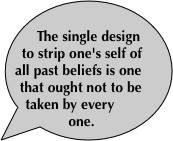 The
single design to strip one's self of all past
beliefs is one that ought not to be taken by
every one. The majority of men is composed of
two classes, for neither of which would this
be at all a befitting resolution: in the
first place, of those who with more than a
due confidence in their own powers, are rash
in their judgments and want the patience
requisite for orderly and circumspect
thinking; whence it happens, that if men of
this class once take the liberty to doubt of
their accustomed opinions, and quit the
beaten highway, they will never be able to
thread the byway that would lead them by a
shorter course, and will lose themselves and
continue to wander for life; in the second
place, of those who, possessed of sufficient
sense or modesty to determine that there are
others who excel them in the power of
discriminating between truth and error, and
by whom they may be instructed, ought rather
to content themselves with the opinions of
such than trust for more correct to their own
reason. The
single design to strip one's self of all past
beliefs is one that ought not to be taken by
every one. The majority of men is composed of
two classes, for neither of which would this
be at all a befitting resolution: in the
first place, of those who with more than a
due confidence in their own powers, are rash
in their judgments and want the patience
requisite for orderly and circumspect
thinking; whence it happens, that if men of
this class once take the liberty to doubt of
their accustomed opinions, and quit the
beaten highway, they will never be able to
thread the byway that would lead them by a
shorter course, and will lose themselves and
continue to wander for life; in the second
place, of those who, possessed of sufficient
sense or modesty to determine that there are
others who excel them in the power of
discriminating between truth and error, and
by whom they may be instructed, ought rather
to content themselves with the opinions of
such than trust for more correct to their own
reason.
For
my own part, I should doubtless have belonged
to the latter class, had I received
instruction from but one master, or had I
never known the diversities of opinion that
from time immemorial have prevailed among men
of the greatest learning. But I had become
aware, even so early as during my college
life, that no opinion, however absurd and
incredible, can be imagined, which has not
been maintained by some one of the
philosophers; and afterwards in the course of
my travels I remarked that all those whose
opinions are decidedly unacceptable to ours
are not in that account barbarians and
savages, but on the contrary that many of
these nations make an equally good, if not
better, use of their reason than we do. I
took into account also the very different
character which a person brought up from
infancy in France or Germany exhibits, from
that which, with the same mind originally,
this individual would have possessed had
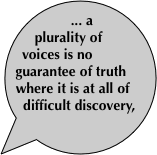 he
lived always among the Chinese or with
savages, and the circumstance that in dress
itself the fashion which pleased us ten years
ago, and which may again, perhaps, be
received into favor before ten years have
gone, appears to us at this moment
extravagant and ridiculous. I was thus led to
infer that the ground of our opinions is far
more custom and example than any certain
knowledge. And, finally, although such be the
ground of our opinions, I remarked that a
plurality of voices is no guarantee of truth
where it is at all of difficult discovery, as
in such cases it is much more likely that it
will be found by one than by many. I could,
however, select from the crowd no one whose
opinions seemed worthy of preference, and
thus I found myself constrained, as it were,
to use my own reason in the conduct of my
life. he
lived always among the Chinese or with
savages, and the circumstance that in dress
itself the fashion which pleased us ten years
ago, and which may again, perhaps, be
received into favor before ten years have
gone, appears to us at this moment
extravagant and ridiculous. I was thus led to
infer that the ground of our opinions is far
more custom and example than any certain
knowledge. And, finally, although such be the
ground of our opinions, I remarked that a
plurality of voices is no guarantee of truth
where it is at all of difficult discovery, as
in such cases it is much more likely that it
will be found by one than by many. I could,
however, select from the crowd no one whose
opinions seemed worthy of preference, and
thus I found myself constrained, as it were,
to use my own reason in the conduct of my
life.
But
like one walking alone and in the dark, I
resolved to proceed so slowly and with such
wary, that if I did not advance far, I would
at least guard against falling. I did not
even choose to dismiss summarily any of the
opinions that had crept into my belief
without having been introduced by reason, but
first of all took sufficient time carefully
to satisfy myself of the general nature of
the task I was setting myself, and ascertain
the true method by which to arrive at the
knowledge of whatever lay within the compass
of my powers.
Among
the branches of philosophy, I had, at an
earlier period, given some attention to
logic, and among those of the mathematics to
geometrical analysis and algebra, -- three
arts or sciences which ought, as I conceived,
to contribute something to my design. But, on
examination, I found that, as for logic, its
syllogisms and the majority of its other
precepts are of avail - rather in the
communication of what we already know, or
even as the art of Lully, in speaking without
judgment of things of which we are ignorant,
than in the investigation of the unknown; and
although this science contains indeed a
number of correct and very excellent
precepts, there are, nevertheless, so many
others, and these either injurious or
superfluous, mingled with the former, that it
is almost quite as difficult to effect a
severance of the true from the false as it is
to extract a Diana or a Minerva from a rough
block of marble. Then as to the analysis of
the ancients and the algebra of the moderns,
besides that they embrace only matters highly
abstract, and, to appearance, of no use, the
former is so exclusively restricted to the
consideration of figures, that it can
exercise 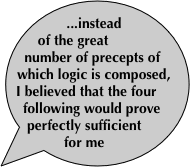 the
understanding only on condition of greatly
fatiguing the imagination; and, in the
latter, there is so complete a subjection to
certain rules and formulas, that there
results an art full of confusion and
obscurity calculated to embarrass, instead of
a science fitted to cultivate the mind. By
these considerations I was induced to seek
some other method which would comprise the
advantages of the three and be exempt from
their defects. And as a multitude of laws
often only hinders justice, so that a state
is best governed when, with few laws, these
are rigidly administered; in like manner,
instead of the great number of precepts of
which logic is composed, I believed that the
four following would prove perfectly
sufficient for me, provided I took the firm
and unwavering resolution never in a single
instance to fail in observing
them. the
understanding only on condition of greatly
fatiguing the imagination; and, in the
latter, there is so complete a subjection to
certain rules and formulas, that there
results an art full of confusion and
obscurity calculated to embarrass, instead of
a science fitted to cultivate the mind. By
these considerations I was induced to seek
some other method which would comprise the
advantages of the three and be exempt from
their defects. And as a multitude of laws
often only hinders justice, so that a state
is best governed when, with few laws, these
are rigidly administered; in like manner,
instead of the great number of precepts of
which logic is composed, I believed that the
four following would prove perfectly
sufficient for me, provided I took the firm
and unwavering resolution never in a single
instance to fail in observing
them.
 The first
was
never to accept anything for true which I
did not clearly know to be
such;
that is to say, carefully to avoid
precipitancy and prejudice, and to
comprise nothing more in my judgement than
what was presented to my mind so clearly
and distinctly as to exclude all ground of
doubt.
The first
was
never to accept anything for true which I
did not clearly know to be
such;
that is to say, carefully to avoid
precipitancy and prejudice, and to
comprise nothing more in my judgement than
what was presented to my mind so clearly
and distinctly as to exclude all ground of
doubt.
 The second,
to
divide each of the difficulties under
examination into as many parts as
possible, and as might be necessary for
its adequate
solution.
The second,
to
divide each of the difficulties under
examination into as many parts as
possible, and as might be necessary for
its adequate
solution.
 The third, to conduct my thoughts
in
such order
that,
by commencing with objects the simplest
and easiest to know,
I
might ascend by little and little, and, as
it were, step by step, to the knowledge of
the more
complex;
assigning in thought a certain order even
to those objects which in their own nature
do not stand in a relation of antecedence
and sequence.
The third, to conduct my thoughts
in
such order
that,
by commencing with objects the simplest
and easiest to know,
I
might ascend by little and little, and, as
it were, step by step, to the knowledge of
the more
complex;
assigning in thought a certain order even
to those objects which in their own nature
do not stand in a relation of antecedence
and sequence.
 And fourth,
in
every case to make enumerations so
complete, and reviews so general, that I
might be assured that nothing was
omitted.
And fourth,
in
every case to make enumerations so
complete, and reviews so general, that I
might be assured that nothing was
omitted.
The
long chains of simple and easy reasonings by
means of which geometers are accustomed to
reach the conclusions of their most difficult
demonstrations, had led me to imagine that
all things, to the knowledge of which man is
competent, are mutually connected in the same
way, and that there is nothing so far removed
from us as to be beyond our reach, or so
hidden that we cannot discover it, provided
only we abstain from accepting the false for
the true, and always preserve in our thoughts
the order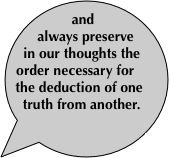 necessary for the deduction of one truth from
another. And I had little difficulty in
determining the objects with which it was
necessary to commence, for I was already
persuaded that it must be with the simplest
and easiest to know, and, considering that of
all those who have hitherto sought truth in
the sciences, the mathematicians alone have
been able to find any demonstrations, that
is, any certain and evident reasons, I did
not doubt but that such must have been the
rule of their investigations. I resolved to
commence, therefore, with the examination of
the simplest objects, not anticipating,
however, from this any other advantage than
that to be found in accustoming my mind to
the love and nourishment of truth, and to a
distaste for all such reasonings as were
unsound. But I had no intention on that
account of attempting to master all the
particular sciences commonly denominated
mathematics: but observing that, however
different their objects, they all agree in
considering only the various relations or
proportions subsisting among those objects, I
thought it best for my purpose to consider
these proportions in the most general form
possible, without referring them to any
objects in particular, except such as would
most facilitate the knowledge of them, and
without by any means restricting them to
these, that afterwards I might thus be the
better able to apply them to every other
class of objects to which they are
legitimately applicable. Perceiving further,
that in order to understand these relations I
should
necessary for the deduction of one truth from
another. And I had little difficulty in
determining the objects with which it was
necessary to commence, for I was already
persuaded that it must be with the simplest
and easiest to know, and, considering that of
all those who have hitherto sought truth in
the sciences, the mathematicians alone have
been able to find any demonstrations, that
is, any certain and evident reasons, I did
not doubt but that such must have been the
rule of their investigations. I resolved to
commence, therefore, with the examination of
the simplest objects, not anticipating,
however, from this any other advantage than
that to be found in accustoming my mind to
the love and nourishment of truth, and to a
distaste for all such reasonings as were
unsound. But I had no intention on that
account of attempting to master all the
particular sciences commonly denominated
mathematics: but observing that, however
different their objects, they all agree in
considering only the various relations or
proportions subsisting among those objects, I
thought it best for my purpose to consider
these proportions in the most general form
possible, without referring them to any
objects in particular, except such as would
most facilitate the knowledge of them, and
without by any means restricting them to
these, that afterwards I might thus be the
better able to apply them to every other
class of objects to which they are
legitimately applicable. Perceiving further,
that in order to understand these relations I
should 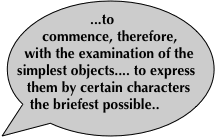 sometimes
have to consider them one by one and
sometimes only to bear them in mind, or
embrace them in the totality, I thought that,
in order the better to consider them
individually, I should view them as
subsisting between straight lines, than which
I could find no objects more simple, or
capable of being more distinctly represented
to my imagination and senses; and on the
other hand, that in order to retain them in
the memory or embrace an aggregate of many, I
should express them by certain characters the
briefest possible. In this way I believed
that I could borrow all that was best both in
geometrical analysis and in algebra, and
correct all the defects of the one by help of
the other. sometimes
have to consider them one by one and
sometimes only to bear them in mind, or
embrace them in the totality, I thought that,
in order the better to consider them
individually, I should view them as
subsisting between straight lines, than which
I could find no objects more simple, or
capable of being more distinctly represented
to my imagination and senses; and on the
other hand, that in order to retain them in
the memory or embrace an aggregate of many, I
should express them by certain characters the
briefest possible. In this way I believed
that I could borrow all that was best both in
geometrical analysis and in algebra, and
correct all the defects of the one by help of
the other.
And,
in point of fact, the accurate observance of
these few precepts gave me, I take the
liberty of saying, such ease in unraveling
all the questions embraced in these two
sciences, that in the two or three months I
devoted to their examination, not only did I
reach solutions of questions I had formerly
deemed exceedingly difficult but even as
regards questions of the solution of which I
continued ignorant; 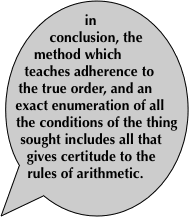 I
was enabled, as it appeared to me, to
determine the means whereby, and the extent
to which a solution was possible; results
attributable to the circumstance that I
commenced with the simplest and most general
truths, and that thus each truth discovered
was a rule available in the discovery of
subsequent ones. Nor in this perhaps shall I
appear too vain, if it be considered that, as
the truth on any particular point is one,
whoever apprehends the truth, knows all that
on that point can be known. The child, for
example, who has been instructed in the
elements of arithmetic, and has made a
particular addition, according to rule, may
be assured that he has found, with respect to
the sum of the numbers before him, and that
in this instance is within the reach of human
genius. Now, in conclusion, the method which
teaches adherence to the true order, and an
exact enumeration of all the conditions of
the thing sought includes all that gives
certitude to the rules of
arithmetic. I
was enabled, as it appeared to me, to
determine the means whereby, and the extent
to which a solution was possible; results
attributable to the circumstance that I
commenced with the simplest and most general
truths, and that thus each truth discovered
was a rule available in the discovery of
subsequent ones. Nor in this perhaps shall I
appear too vain, if it be considered that, as
the truth on any particular point is one,
whoever apprehends the truth, knows all that
on that point can be known. The child, for
example, who has been instructed in the
elements of arithmetic, and has made a
particular addition, according to rule, may
be assured that he has found, with respect to
the sum of the numbers before him, and that
in this instance is within the reach of human
genius. Now, in conclusion, the method which
teaches adherence to the true order, and an
exact enumeration of all the conditions of
the thing sought includes all that gives
certitude to the rules of
arithmetic.
But
the chief ground of my satisfaction with this
method, was the assurance I had of thereby
exercising my reason in all matters, if not
with absolute perfection, at least with the
greatest attainable by me: besides, I was
conscious that by its use my mind was
becoming gradually habituated to clearer and
more distinct conceptions of its objects; and
I hoped also, from not having restricted this
method to any particular matter, to apply it
to the difficulties of the other sciences,
with not less success than to those of
algebra. I should not, however, on this
account have ventured at once on the
examination of all the difficulties of the
sciences which presented themselves to me,
for this would have been contrary to the
order prescribed in the method, but observing
that the knowledge of such is dependent on
principles borrowed from philosophy, in which
I found nothing certain, I thought
it necessary first of all to endeavor to
establish its principles. And
because I observed, besides, that an inquiry
of this kind was of all others of the
greatest moment, and one in which rashness
and anticipation in judgment were most to be
dreaded, I thought that I ought not to
approach it till I had reached a more mature
age (being at that time but twenty-three),
and had first of all employed much of my time
in preparation for the work, as well by
eradicating from my mind all the erroneous
opinions I had up to that moment accepted, as
by amassing variety of experience to afford
materials for my reasonings, and by
continually exercising myself in my chosen
method with a view to increased skill in its
application.'
Thus
far René Descartes on the method. It is
this method which, departing from the true
religion of the sane mind of tolerance and
prudence, from single-minded witnessing through
doubt arrives at a clearly to oversee science
incorporating each and everyone. That
mathematically correct deduction from the
necessary and inevitable order which
non-repressively departs from a certain
conceptual simplicity, ultimately has brought us
the power of reforming the reason with which we
first of all created this website and we
ourselves - not only literary operating thus -
have found a life. Not to say that rationalism
would be our final belief, or that we for that
reason would want to philosophize endlessly
about the multitude of philosophers* also
commenting on this subject, but because the
method as such reflects the expression in our
western terms of a truth, as Descartes says a
truth of principles, which we find presented in
the oldest scriptures of India. We, according
our fundamental thesis, want to demonstrate with
it, that concerning the time and the order
thereof with the ether, of which Descartes said
that the universe is purely made of it, it in
the foregoing cultures in the world is the way
the dutch philosopher and ethical thinker Baruch
Spinoza filognostically correctly stated it:
'Still
can the greater of nature not be denied and
retains she her fixed and immutable
order'.
For
more info on the person of this philosopher and
his works and place in history go to the
renown
ego's page
*
See the timelinks-page
and the quotes-page
for more philosophers about time.
*
For more info on this philosopher and his works
and place in history, see
the
Renown
Ego's - page.
*
See for an
overview
of the history of philosophy Bryan Magee's
highly readable
book
'The
Story of
Philosophy'
(1998,
Dorling Kinserly Limited London).
*
Other philosophy-links: the Linking-Library
- philosophy.
versie
in het
Nederlands

|


|







